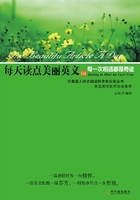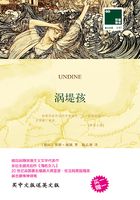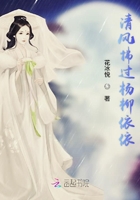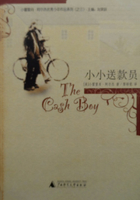On reading over what I have written of the Stricklands, I am conscious that they must seem shadowy. I have been able to invest them with none of those characteristics which make the persons of a book exist with a real life of their own; and, wondering if the fault is mine, I rack my brains to remember idiosyncrasies which might lend them vividness. I feel that by dwelling on some trick of speech or some queer habit I should be able to give them a significance peculiar to themselves. As they stand they are like the figures in an old tapestry; they do not separate themselves from the background, and at a distance seem to lose their pattern, so that you have little but a pleasing piece of colour. My only excuse is that the impression they made on me was no other. There was just that shadowiness about them which you find in people whose lives are part of the social organism, so that they exist in it and by it only. They are like cells in the body, essential, but, so long as they remain healthy, engulfed in the momentous whole. The Stricklands were an average family in the middle class. A pleasant, hospitable woman, with a harmless craze for the small lions of literary society; a rather dull man, doing his duty in that state of life in which a merciful Providence had placed him; two nice-looking, healthy children. Nothing could be more ordinary. I do not know that there was anything about them to excite the attention of the curious.
When I reflect on all that happened later, I ask myself if I was thick-witted not to see that there was in Charles Strickland at least something out of the common. Perhaps. I think that I have gathered in the years that intervene between then and now a fair knowledge of mankind, but even if when I first met the Stricklands I had the experience which I have now, I do not believe that I should have judged them differently. But because I have learnt that man is incalculable, I should not at this time of day be so surprised by the news that reached me when in the early autumn I returned to London.
I had not been back twenty-four hours before I ran across Rose Waterford in Jermyn Street.
"You look very gay and sprightly," I said. "What's the matter with you?"
She smiled, and her eyes shone with a malice I knew already. It meant that she had heard some scandal about one of her friends, and the instinct of the literary woman was all alert.
"You did meet Charles Strickland, didn't you?"
Not only her face, but her whole body, gave a sense of alacrity. I nodded. I wondered if the poor devil had been hammered on the Stock Exchange or run over by an omnibus.
"Isn't it dreadful? He's run away from his wife."
Miss Waterford certainly felt that she could not do her subject justice on the curb of Jermyn Street, and so, like an artist, flung the bare fact at me and declared that she knew no details. I could not do her the injustice of supposing that so trifling a circumstance would have prevented her from giving them, but she was obstinate.
"I tell you I know nothing," she said, in reply to my agitated questions, and then, with an airy shrug of the shoulders: "I believe that a young person in a city tea-shop has left her situation."
She flashed a smile at me, and, protesting an engagement with her dentist, jauntily walked on. I was more interested than distressed. In those days my experience of life at first hand was small, and it excited me to come upon an incident among people I knew of the same sort as I had read in books. I confess that time has now accustomed me to incidents of this character among my acquaintance. But I was a little shocked. Strickland was certainly forty, and I thought it disgusting that a man of his age should concern himself with affairs of the heart. With the superciliousness of extreme youth, I put thirty-five as the utmost limit at which a man might fall in love without making a fool of himself. And this news was slightly disconcerting to me personally, because I had written from the country to Mrs. Strickland, announcing my return, and had added that unless I heard from her to the contrary, I would come on a certain day to drink a dish of tea with her. This was the very day, and I had received no word from Mrs. Strickland. Did she want to see me or did she not? It was likely enough that in the agitation of the moment my note had escaped her memory. Perhaps I should be wiser not to go. On the other hand, she might wish to keep the affair quiet, and it might be highly indiscreet on my part to give any sign that this strange news had reached me. I was torn between the fear of hurting a nice woman's feelings and the fear of being in the way. I felt she must be suffering, and I did not want to see a pain which I could not help; but in my heart was a desire, that I felt a little ashamed of, to see how she was taking it. I did not know what to do.
Finally it occurred to me that I would call as though nothing had happened, and send a message in by the maid asking Mrs. Strickland if it was convenient for her to see me. This would give her the opportunity to send me away. But I was overwhelmed with embarrassment when I said to the maid the phrase I had prepared, and while I waited for the answer in a dark passage I had to call up all my strength of mind not to bolt. The maid came back. Her manner suggested to my excited fancy a complete knowledge of the domestic calamity.
"Will you come this way, sir?" she said.
I followed her into the drawing-room. The blinds were partly drawn to darken the room, and Mrs. Strickland was sitting with her back to the light. Her brother-in-law, Colonel MacAndrew, stood in front of the fireplace, warming his back at an unlit fire. To myself my entrance seemed excessively awkward. I imagined that my arrival had taken them by surprise, and Mrs. Strickland had let me come in only because she had forgotten to put me off. I fancied that the Colonel resented the interruption.
"I wasn't quite sure if you expected me," I said, trying to seem unconcerned.
"Of course I did. Anne will bring the tea in a minute."
Even in the darkened room, I could not help seeing that Mrs. Strickland's face was all swollen with tears. Her skin, never very good, was earthy.
"You remember my brother-in-law, don't you? You met at dinner, just before the holidays."
We shook hands. I felt so shy that I could think of nothing to say, but Mrs. Strickland came to my rescue. She asked me what I had been doing with myself during the summer, and with this help I managed to make some conversation till tea was brought in. The Colonel asked for a whisky-and-soda.
"You'd better have one too, Amy," he said.
"No; I prefer tea."
This was the first suggestion that anything untoward had happened. I took no notice, and did my best to engage Mrs. Strickland in talk. The Colonel, still standing in front of the fireplace, uttered no word. I wondered how soon I could decently take my leave, and I asked myself why on earth Mrs. Strickland had allowed me to come. There were no flowers, and various knick-knacks, put away during the summer, had not been replaced; there was something cheerless and stiff about the room which had always seemed so friendly; it gave you an odd feeling, as though someone were lying dead on the other side of the wall. I finished tea.
"Will you have a cigarette?" asked Mrs. Strickland.
She looked about for the box, but it was not to be seen.
"I'm afraid there are none."
Suddenly she burst into tears, and hurried from the room.
I was startled. I suppose now that the lack of cigarettes, brought as a rule by her husband, forced him back upon her recollection, and the new feeling that the small comforts she was used to were missing gave her a sudden pang. She realised that the old life was gone and done with. It was impossible to keep up our social pretences any longer.
"I dare say you'd like me to go," I said to the Colonel, getting up.
"I suppose you've heard that blackguard has deserted her," he cried explosively.
I hesitated.
"You know how people gossip," I answered. "I was vaguely told that something was wrong."
"He's bolted. He's gone off to Paris with a woman. He's left Amy without a penny."
"I'm awfully sorry," I said, not knowing what else to say.
The Colonel gulped down his whisky. He was a tall, lean man of fifty, with a drooping moustache and grey hair. He had pale blue eyes and a weak mouth. I remembered from my previous meeting with him that he had a foolish face, and was proud of the fact that for the ten years before he left the army he had played polo three days a week.
"I don't suppose Mrs. Strickland wants to be bothered with me just now," I said. "Will you tell her how sorry I am? If there's anything I can do. I shall be delighted to do it."
He took no notice of me.
"I don't know what's to become of her. And then there are the children. Are they going to live on air? Seventeen years."
"What about seventeen years?"
"They've been married," he snapped. "I never liked him. Of course he was my brother-in-law, and I made the best of it. Did you think him a gentleman? She ought never to have married him."
"Is it absolutely final?"
"There's only one thing for her to do, and that's to divorce him. That's what I was telling her when you came in. ‘Fire in with your petition, my dear Amy,' I said. ‘You owe it to yourself and you owe it to the children.' He'd better not let me catch sight of him. I'd thrash him within an inch of his life."
I could not help thinking that Colonel MacAndrew might have some difficulty in doing this, since Strickland had struck me as a hefty fellow, but I did not say anything. It is always distressing when outraged morality does not possess the strength of arm to administer direct chastisement on the sinner. I was making up my mind to another attempt at going when Mrs. Strickland came back. She had dried her eyes and powdered her nose.
"I'm sorry I broke down," she said. "I'm glad you didn't go away."
She sat down. I did not at all know what to say. I felt a certain shyness at referring to matters which were no concern of mine. I did not then know the besetting sin of woman, the passion to discuss her private affairs with anyone who is willing to listen. Mrs. Strickland seemed to make an effort over herself.
"Are people talking about it?" she asked.
I was taken aback by her assumption that I knew all about her domestic misfortune.
"I've only just come back. The only person I've seen is Rose Waterford."
Mrs. Strickland clasped her hands.
"Tell me exactly what she said." And when I hesitated, she insisted. "I particularly want to know."
"You know the way people talk. She's not very reliable, is she? She said your husband had left you."
"Is that all?"
I did not choose to repeat Rose Waterford's parting reference to a girl from a tea-shop. I lied.
"She didn't say anything about his going with anyone?"
"No."
"That's all I wanted to know."
I was a little puzzled, but at all events I understood that I might now take my leave. When I shook hands with Mrs. Strickland I told her that if I could be of any use to her I should be very glad. She smiled wanly.
"Thank you so much. I don't know that anybody can do anything for me."
Too shy to express my sympathy, I turned to say good-bye to the Colonel. He did not take my hand.
"I'm just coming. If you're walking up Victoria Street, I'll come along with you."
"All right," I said. "Come on."















